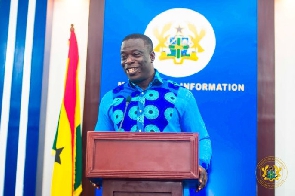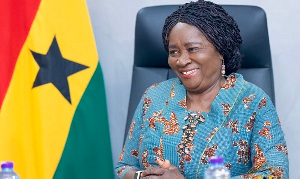Mr Ignatius Baffour-Awuah, the Minister of Employment and Labour Relations, says the emergence of artificial intelligence and technological advancement into the work environment will invariably result in loss of traditional jobs.
He said due to the technological advancement under the Fourth Industrial Revolution, many countries worldwide were shifting from traditional economy to a new era of production and service delivery using innovative technologies.
In that vein, the Minister said government was promoting technical and vocational training as well as active labour market programmes to equip people with the requisite skills to find alternative jobs on the labour market.
He, therefore, underlined the need for countries to train their workforce to develop robust skills and competences to find new or alternative jobs to sustain their economies.
Mr Baffour-Awuah said this at the opening of a two-day stakeholders’ workshop in Accra on Wednesday, to solicit views from key players to develop national strategy for safeguarding potential jobs for workers and persons who might lose their sources of livelihood as a result of climate change and technological advancement.
The event was held on the theme: “Taking Stock and Identifying High Potential Entry Points for Promoting Green Jobs in Ghana,” /
IT brought together environmental consultants, policy-makers and representatives from the Trades Union Congress, Ghana Employers Association, National Development Planning Commission, Environmental Protection Agency, International Labour Organisation, Labour Department, Ministries of Finance and Employment and Labour Relations.
Mr Baffour-Awuah said the effect of climate change on the environment was real and urged countries to take proactive measures to safeguard the environment by reducing carbon emissions into the atmosphere and prevent unfriendly-environmental practices.
“If you look at issues of technological advancement and its impact on work, it’s very real. Not too long ago, Ghana government through the Ghana Ports and Harbours Authority entered into an agreement with a private investor for an investment into Tema Port.
“The investors planned to make Tema Port one of the first-class points of call in Africa, therefore the investment team came with new technologies, and when it dawned on workers that the technology is going to have resultant effects on the number of persons that will be engaged, there were protests.
“In fact, it took the intervention of His Excellence, the President to step in to stop that, otherwise, the lay-off was going to happen because new technologies have been introduced and would not require the same number of persons operating at the old port,” Mr Baffour-Awuah explained.
He, however, acknowledged that the new era in technological advancement has brought along some new job opportunities, and believed that those who would avail themselves for training would make a breakthrough in life.
He said the new employment policy had been designed to develop skills to make the people adapt to climate change and technological advancement so that no one is left behind.
The Minister said while employers were adopting innovative technologies to reduce the cost of operations and enhance productivity, the nation must also adopt innovative strategies to create jobs for the people.
According to 2017 Ghana Living Standard Survey, agriculture contributes 38 per cent to job creation, services constituted 45 per cent and industry offers 18 per cent.
Mr Dennis Zulu, the International Labour Organisation (ILO) Director for West Africa, in his welcome address, said the effect of climate change was affecting the economies of many nations in the world and underscored the need for every nation to be more responsible and utilise the national resources to create job opportunities for the people.
He said Ghana had been an exemplary member of the ILO, explaining that statistics available showed many jobs had been created by the government of Ghana.
Mr Zulu called for efficient application of renewable energy sources, reduction of carbon emissions and more use of organic agriculture to make the earth a safer place for all.
The Trades Union Congress and the Ghana Employers Association pledged their support to government to make the best use of technological advancement and climate change adaptation policies to create jobs.
Business News of Thursday, 22 August 2019
Source: ghananewsagency.org













